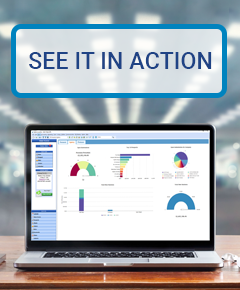
Marketing, Sales
A lot has changed over the past few years due to the
unexpected disruptions of the COVID-19 pandemic. All industries felt the impact,
and the insurance industry is no exception. One of the most notable disruptions
is the speed at which changes took place, especially around customer
expectations and marketing.
What Your Agency Needs to Know About Insurance Marketing
Changes in insurance agency marketing that were projected to solidify in 5 to 10 years ended up evolving rapidly in just two. Chances are you’ve already made some of these adjustments to keep up with immediate demand, but there are other more “behind the scenes” adjustments agencies are making that you should note.
1) Know how people find you
Do you know how clients are ending up at your agency?
Whether through referrals, phone calls, or other methods, you need to know and
understand how to capitalize on those areas.
One of the most prominent channels these days is online
searches. Surveys show that almost 70% of consumers run an online search
before reaching out to an agency. And, over 65% of insurance consumers did
not have a specific agency in mind when they started their search. Queries for
terms like “insurance near me” have grown by over 100% in the past two
years. Are you poised to show up in the results?
As a result of this uptick in online searches, Search Engine
Optimization (SEO) is extremely valuable. Pay attention to what’s on your
website, focusing on adding specific key search terms throughout your pages for
ideal optimization. Paid advertising on search engines like Google and Bing can
also boost your visibility but at a cost. Some of these ads cost more than $50
per click, putting them at the high end of search engine advertising.
How your website looks is also a factor. Over 50% of online searches for insurance take place on mobile devices. If your website isn’t optimized for mobile, you can quickly turn a potential customer away. And, Google includes mobile optimization as part of their algorithm, meaning you can be dinged if you have an incompatible site. Your site should be mobile optimized, easy to navigate and provide a clear way for interested visitors to get in touch.
2) Know how prospects make decisions
As an agency, you need to understand a potential buyer’s thinking when evaluating their insurance options. Price and types of insurance offered remain top of the list as decisive factors, but service quality is becoming more prominent.
To hit on potential customer needs, your agency should offer various ways for customers to get in touch with you. Offer online, text, phone, chat, and in-person options to fit varying consumer preferences. Self-service portals and mobile apps are becoming increasingly popular as a first contact source to get in touch and gather the information prospects need to decide.
Yet, surveys showed 78% of insurance customers called an agency after running a search, and 62% said talking with an insurance rep was the “most influential factor” in making their decision. This shows that your online presence matters, but your human service interactions matter, too.
When Your Service Makes a Difference
Specific turning points in the customer’s journey make a big
difference. What you do in those moments can either turn a prospect into a
customer or turn a prospect away. Some of those critical moments include:
1) Your response time and quality
The immediacy, accuracy, and
overall quality of your response to initial outreach make a big difference in
how customers and prospects perceive your agency. Surveys show most callers hang
up after waiting about 90 seconds for a response, so you need to ensure
you’re connecting with individuals quickly.
Systems like marketing automation
are extremely valuable here as they instantly send a response to individuals
who email, fill out a contact form, or connect via chat, among other contact
methods. To add quality to your responses, connect your marketing automation
with your insurance
CRM to automatically create follow-up tasks so you can connect on a
personal level.
2) Your level of personalization
Along with the rise in demand for
immediate, digital service, customers are also asking for more
personalization and human connection. Almost 90% of insurance customers
surveyed said they demand more personalization from their providers. And, 84%
of marketers said phone calls have higher conversion rates than other
outreach methods. The personal connection found in a phone call still matters.
You can create opportunities for
personalization via digital connections, too. Marketing
automation is designed to make emails, social media connections, and other
forms of digital outreach as targeted to each individual recipient as possible.
The takeaway here is that your agency needs to offer multiple avenues for
connection to meet the varying needs of your growing customer base.
Who Can Help Your Agency Stay Nimble
Our Partner Platform team and agency community are committed to understanding growing insurance marketing and service trends. We provide regular webinars, in-person trainings, and an annual user conference as just a few ways to connect and discuss changes in the market.
Plus, our partners in the insurance tech industry help our community stay up-to-date on the latest technology, keeping our Partner Platform agencies well equipped.
Find out more about our Partner Platform community and how to get connected: contact us at [email protected] or 800.747.7005, Option 6.
Source: https://www.invoca.com/blog/insurance-marketing-statistics

Agency Management System Best Practices, Change Management, Technology Trends
The COVID-19 outbreak in 2020 left a lasting impact on the world, including how we do business. Quarantine and frequent lockdowns forced us to stay home, and the changes in customer expectations, work environments, and operations remain today.
Insurance agencies that weathered these changes have a few things in common. For one, they had the right insurance software to make the quick transition to remote work and service. Secondly, they have an enduring attitude of being open to change and a readiness to adapt. While we cannot predict what will disrupt the market next, we can use these markers to prepare with the right mindset, tools, and systems for the next unexpected interruption.
1. Adapting Your Systems
It’s impossible to overemphasize the need for an agency-wide digital insurance experience. That includes leveraging digital marketing through areas like social media, email marketing, and your website. In addition, include digital access options for both your customers and your staff. Offer eSignatures for document signing, employ digital form fills, digital document storing, and digital payments. These systems are essential for the modern agency to stay relevant to clients, increase ease of doing business, and continue growth.
Another system to embrace is remote work. Remote
work was essential during the COVID-19 lockdowns, and it remains valuable
today. Many employees expect remote working options, and experience shows
remote work can be just as, or more, effective as in-office work.
2. Leveraging the Right Tools
Many new insurance software tools became standard during the 2020 lockdowns. One type was virtual communication tools like online meeting platforms, chats, and online customer service portals. Customers expect to be able to get in touch with you via one or all of these methods. Alongside these digital communication tools, pay attention to your internet connections. Ensure you have reliable, high-speed service to keep connected at all times.
Besides communication tools, your agency also needs marketing automation and a customer relationship management (CRM) tool to better track and engage with customers and prospects. Marketing automation directly feeds new customer expectations with frequent and personalized messaging. A CRM gives you a better picture of who your customers are and how you can grow your book of business. Both these tools are now standard in the insurance software space.
3. Getting in a Growth Mindset
One of the biggest hurdles is shaping a new agency mindset. Adapting to change isn’t easy, but if you can set up a “change happens and creates opportunities” attitude, you can make it that much easier to move to something new. Work with your team to keep them open to change, including getting them involved in decisions around adding new tech and systems to your agency. The more your staff feels a part of the “something new,” the more likely they will participate in it.
Another great way to keep your team ready for change is to provide learning opportunities throughout the year. Expose them to changes in the industry and educate them, so they feel more comfortable with new technology or operation styles.
4. Working with Partners that Support Your Growth
As you expand your insurance software and systems, pay attention to who you’re partnering with in your systems and tech. Select providers and partners who embody the same growth-focused attitude and offer enhancements or updates with their technology.
Our team at SIS has always focused on how we can improve and adapt to serve our independent agency clients better. When the lockdowns took hold in 2020, we sprang into action to keep our Partner Platform agencies well equipped. Elements like cloud-based systems, modern platform updates, and adaptable communication tools made the unexpected transition smoother.
Find out more about how we challenge the status quo, adapting with and for our Partner Platform agencies to ready them for whatever comes next. Get in touch at [email protected] or 800.747.7005, Option 6, to view a demo and talk with one of our team today.

Marketing, Sales
Social media marketing is nothing new in the larger
marketing industry but may be novel for independent insurance agencies. This
tool is something all agencies should include in their insurance agency
marketing strategy for several reasons. Social media can help your agency show
off your expertise, build trust with customers and prospects, and help you
better engage your customer base. For independent agencies, social media is an
excellent tool to amplify their valuable local and personal connections with
their communities.
Whether your agency is on social media or not, you’re being discussed in the social media space. Join in that conversation! Get your agency started by following a few simple dos and don’ts in the social media sphere.
Social Media “Dos”
To start, here are a few “must-dos” for
your insurance agency’s social media marketing.
- Get someone who knows what they’re doing or willing to learn. Don’t put your office manager on social media duty if they have no knowledge or interest in the job. Consider social media savvy in your hiring process, finding someone who has a knack for this unique role.
- Understand what your customers want to see in your social profiles. You can start by looking at other agencies or local businesses to see what content gets the most engagement. Then, ask your customers what topics interest them and go from there.
- Define your agency’s brand and tone for
all your social platforms. Think about your niche offerings and highlight them in your social media branding. And, pay attention to your tone, keeping it consistent across posts and platforms.
- Prepare all your staff for social media. Regardless of whether they’re doing the posting, everyone on your team needs to understand proper social media etiquette, including what’s appropriate to post and what they should avoid.
- Create a calendar to help plan your posts ahead
of time. Start by planning to have one post a week and expand to three to four times or more as your audience grows and time allows.
- Make opportunities for people to engage with
your content. Ask questions, request photos, or hold contests to get people to comment, like, and share your content with others.
- Track what’s working, keeping a record of what posts are getting the most clicks and shares. You
can use this data to craft better posts for the future.
Social Media “Don’ts”
There are also some common mistakes to avoid when
getting your agency on social media
- Signing up for every platform without researching
which works best for your needs. It’s best to start with one or two platforms
and expand from there.
- Posting a lot one day and then taking a
break. When you post three times in a row then don’t have anything for a
few days, your audience gets confused. Set up a regular cadence for posting and
avoid posting more than once a day.
- Using different account names and pictures for
each platform. Strive for consistency, using the same profile icon for each
platform and a similar name. It may not be possible to have the same name on
each account, but you should try for similar names like “YourLocalAgency”
on one and “Your_Local_Agency” on another.
- Leaving your profile bare. Add as much
relevant information as possible to your account profiles, especially your
agency name, website, and phone number. The more you can put in your profiles,
the easier it is for people to find you and get in touch.
- Making social media a one-way street where
you send out information but never reply. If someone makes a comment or sends
you a message, respond! The more you engage, the more people will follow you.
- Ignoring social media data. The
engagement data you collect on social media is quite valuable. It tells you
what your customers are interested in, and you can use that information to
engage prospects, gain referrals, and solicit reviews from happy customers.
Get the Tech You Need to Capitalize on Social Media
Marketing
One of the best ways to leverage social media data
is by connecting it with your
agency’s CRM system. You can use social media data to understand different
customer segments’ interests and adjust your prospecting to meet those needs.
Another great tool is a marketing
automation tool that can schedule social media posts, track engagement, and
reply to messages and comments. Plus, you can link marketing automation and
your CRM for a seamless transition between social media outreach and data
analysis.
A final helpful piece of tech is a reputation
management tool to help manage your agency reviews. People are leaving reviews
about your agency regardless of whether you know it or not, and a reputation
management tool can help you stay on top of them. You can track reviews, reply
to them, and solicit reviews from current customers, all within one tool. Our
Partner Platform agencies use BlueJay
Reviews to track their agency reviews seamlessly within their Partner
Platform agency management system.
We offer all these tools and more as part of our Partner
Platform suite’s Sales
and Marketing capabilities. You can learn more about all our Partner
Platform solutions on our website. And, get in touch with us to
set up a time to talk about your agency’s needs and view a demo
today.

Agency Operations, Technology Trends
This year continued a trend of technology’s growing influence in the insurance market and all industries at large. We saw a shift where more clients embraced agency software and integrated it into their regular systems and processes. This growing interest and influence prompted our Partner Platform and SIS teams to ramp up our tech focus, including several blog posts on this highly relevant topic.
Data
Leveraging technology to gain and analyze data was
one of the hottest topics of the last few years. As competition in the
insurance market increases, agencies need ways to set themselves apart. Our
industry partners and clients alike told us that data is the key to
differentiation. It improves lead targeting to increase close rates,
streamlines claims processes, and is essential to service personalization, a
must-have for all industries today.
Some of our top data posts of the year include:
Cyber Security
With more data sent and stored, your agency is open to more risk. Malware attacks increased by 358% in 2020 alone. Agencies need to pay attention to how they’re handling and storing data, ensuring they have the best measures in place to protect it. Our experts spent time on this critical topic in posts like:
Customer Service
Customer service expectations took a massive leap
in 2020 and 2021. Customers now expect more personalization, quicker
transactions, and more ways to get answers and implement changes independently.
We looked at the many ways expectations changed through our posts this past
year. A few of the top ones include:
Sales and Marketing
Sales and marketing are always a challenge for
growing agencies, but new customer expectations and the explosion of digital
service in the past few years have added a new level. Depending on the agency,
these changes could increase or decrease the sales and marketing challenge. We
hope to make these customer expectations and tech advances an asset to your
outreach with these posts:
Get More Agency Resources Here
These are just a few of the many agency resources available for free on our website. You can see all our educational posts on our blog. And, dive into our online guides and other resources covering topics like how to hire great producers and leaders and how to get effective digital marketing on a budget.
We look forward to sharing more in 2022 and beyond!

Technology Trends
The year 2020 was unique in many ways, one of which was how the isolation of the COVID-19 pandemic accelerated the use of technology across industries. This was just the beginning. We continue to see insurance software emerge as a decisive factor among agencies. Many of our independent agencies identify understanding and embracing tech as critical for survival and growth for small to medium-sized agencies.
So, to prepare our agency clients, we look forward and ask: what does the future of insurance software hold?
An Agency Management System that Can Grow
Gathering, analyzing, and storing prospect and customer data is essential for the future of insurance. Your agency management system is your data hub, and it needs to keep up with expanding data use. Successful agencies will have a management system that evolves with the changing market without interrupting daily service. Modern agency management systems need to live in the cloud, have regular updates, and focus on security to help your agency stay data-forward.
Systems that Work Together
The future of insurance software is systems that work
together without you having to lift a finger. Integrated accounting, email,
texting, quoting, and other systems save time and improve data processing. As
system integration continues to improve, agencies that utilize their management
system as a proper “system of record,” flooding data to and from other
necessary systems without duplicate entry, will get ahead.
Intelligent Reporting
Data reporting and analytics are just as important as storage and integration. As analytics improves, agencies will be able to conduct the type of analyses that large carriers do today. With quality, customizable reporting, your agency can improve lead qualification and identify more ways to grow your current book of business. Analytics can also help improve your customer service, identifying areas of specific need so you can devote resources to address them.
Digital Sales and Marketing
The National Association of Professional Insurance Agents (PIA)’s Independent Insurance Agent Survey found that over 64% of respondents said it’s “Very or Extremely Important” that their partners provide marketing and sales support. These agencies recognize that digitized sales and marketing are now essential for success. That doesn’t mean other marketing forms should go out the window; it simply means you need to diversify your efforts. A quality website, marketing automation to send targeted messaging, and a CRM to track individual sales journeys should all be in your agency sales and marketing toolbelt.
Personalized Customer Service
While your team can provide personalized service to a certain number of customers, it’s difficult for them to keep up once you hit hundreds or more. Digital customer service can help you provide that all-important personal service without your staff needing to work 24/7. Client portals are now expected among millennial and Gen Z insurance customers, giving them access to their plan information and the ability to update information and print insurance cards anytime. Texting is another quality tool that puts customers in direct connection with agents when needed, giving them the immediate, personal attention they expect.
Stay on Top of Insurance Software with Partner Platform
and SIS
Our SIS team knows the value of identifying and
investing in insurance technology. We work alongside our Partner Platform
agencies and specialized tech partnerships to understand emerging needs in the
industry before they become essential. Our Partner Platform integrations and
updates are focused and beta tested, so they’re ready for our agencies to use immediately.
Our goal is to keep growing with and for our agencies for years and decades to come. Find out more about our capabilities, Partner Platform community, and proprietary tech partnerships at sispartnerplatform.com.






